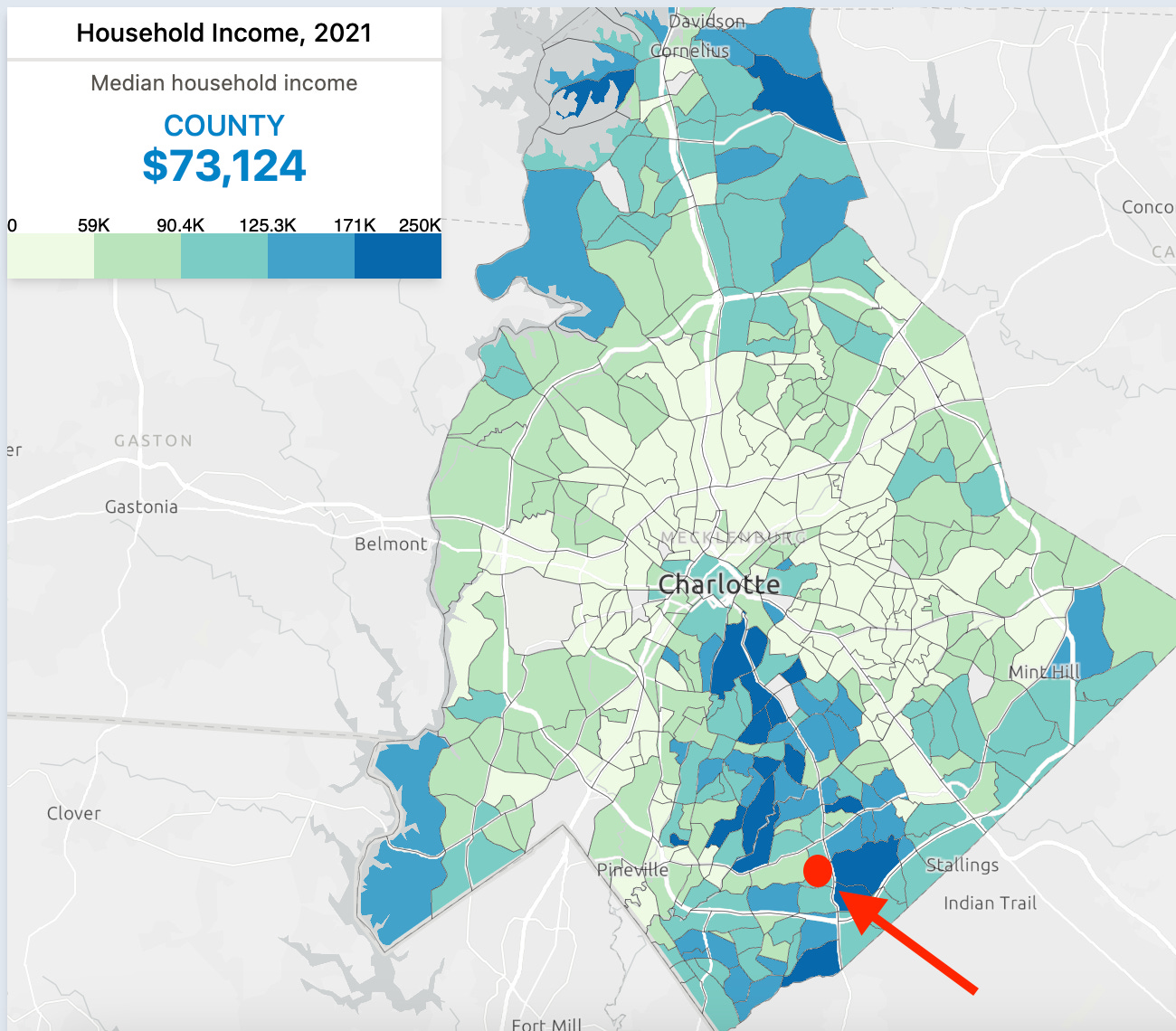How the United Way is rethinking philanthropy
Plus: CLT airport officials moved quickly on Abu Dhabi news; Drone delivery targets high-income south Charlotte; Toppman reviews 'Stick Fly'; Council to name Bokhari successor; ICE arrests
Good morning! Today is Monday, May 19, 2025. You’re reading The Charlotte Ledger, an e-newsletter with local business-y news and insights for Charlotte, N.C.
Need to subscribe — or upgrade your Ledger e-newsletter subscription? Details here.
Today's Charlotte Ledger is sponsored by Robinson Bradshaw, an esteemed Carolinas-based corporate law firm committed to providing clients with comprehensive legal services of the highest quality.
United Way of Greater Charlotte’s new CEO describes the crucial shift from relying on workplace philanthropic giving to building local trust
As Charlotte continues to grapple with long-term, complex issues like economic immobility and unequal access to opportunity, nonprofits that work to address those issues must evolve in how they operate.
The United Way of Greater Charlotte, which started more than 90 years ago as an emergency relief organization during the Great Depression, has shifted from traditional fundraising to a community-focused model that emphasizes equity, grassroots partnerships and measurable change.
In the last year, the United Way has put nearly $18M in community investments into 134 nonprofit organizations across a four-county area: Anson, Cabarrus, Union and Mecklenburg.
Kathryn Firmin-Sellers, who took over as CEO of the United Way of Greater Charlotte last month, sat down with Ledger executive editor Tony Mecia for a recent podcast episode in which she talked about the need to rethink philanthropy, build trust within the community and create change where it’s needed most.
Here are 5 key takeaways from the conversation, lightly edited for brevity:
◼️ On the goal of United Way, and how it accomplishes its mission:
United Way's mission is to lift children and families out of poverty, and we do that by bringing community partners together. We have this unique position at the intersection of the public sector, the private corporate sector, philanthropy and the nonprofit community, and I think we have the trust of each of those stakeholders, and so we are able to bring them together craft a shared vision for our community — and then, through our collective giving model, bring together the resources, the people, the talent and the money to move that shared vision for our community forward.
◼️ On how the workplace giving model that United Way used for decades has changed:
We were probably the original GoFundMe. … In the past, we would go into corporations during our workplace campaign and ask employees to pool their money to advance this shared vision. While workplace campaigns are still important, we now diversify our funding through relationships with private foundations, the public sector and high-wealth donors. People give because they’re inspired by what we’re trying to do — not because it’s expected.
A lot has changed over the years, and the workplace campaign is still really important. We still do execute on the workplace campaigns, but it’s much more of us going in and making the case for why you should give to United Way like any other nonprofit. It’s no longer the case that people are expected, just by a matter of course, to give to United Way. So the people who give to us are really inspired by our vision and inspired by what we’re trying to do.
◼️ On how United Way uses data and decides which nonprofits it is going to fund: We are deeply committed to tracking outcomes, being data-driven, learning from what the data tells us. So every year, each nonprofit that we fund submits a report to us telling how many people they served, of what income levels and what progress they made. … We’re not saying, “What outcome did they achieve in any given year?” because again, it takes a long time. Instead, what we ask is, “How much progress have you made this year toward your intended outcome?” …
United Way has always been a volunteer-driven organization. And so the decision about who we fund has always been driven by community volunteers. We take that very seriously. We trust them to have the right perspective on what they and their community needs. That said, we do make sure that every nonprofit we fund meets certification requirements. We do determine that they are nonprofits. We check their status, they’re legal, they’ve got all their paper in place. We make sure they’ve got certificates of insurance in place, and we make sure that they’re following best practices in terms of financial management. So we do some vetting on the front end, and then we move into community-led decision-making.
◼️ On identifying the most pressing needs in the Charlotte area, and how United Way is addressing them:
Poverty is complex. People are complex. And so you don't solve poverty — you don’t build a pathway to economic prosperity for a family — unless you’re willing to tackle all of the things that those families need. Think about what you need to be successful for you and your family: You need education. You need workforce development. You may have had a mentor at some point in your life. You need reliable transportation to get to and from your job. You need access to health care, mental health care — all of it needs to come together to allow families to thrive.
Housing is obviously foundational if you don't know where you’re going to put your head every night and whether you’re going to wake up with food to eat. So if we want to help families, we have to be willing to invest holistically across all of what are called the social determinants of health. That’s what United Way does when we invest in those 134 nonprofits — we are seeking to invest holistically in what families need in order to thrive in our community.
◼️ On how the needs have changed over time — and what rays of hope might exist:
Many people are familiar with the 2014 Chetty study on economic mobility, and Charlotte was found to be 50th out of the 50 largest cities in the United States.
That was a real wake-up call for everyone, and particularly those of us who work in the philanthropic sector, that we needed to think differently about how we tried to solve these issues of generational poverty. We did that through our United Neighborhoods program (that aims to revitalize historically underserved areas).
The ray of hope I want to give you is that Raj Chetty was back in town last year. He had updated his study of economic mobility, and Charlotte had moved from 50 to 38. What that tells me is that it's not an intractable problem. Poverty can be addressed. Poverty can be solved if we are intentional, if we are committed for the long haul.
➡️Want to hear more? Listen to the recent Charlotte Ledger Podcast episode with Kathryn Firmin-Sellers:
Related Ledger articles:
“Chetty offers ideas to boost Charlotte's economic mobility” (Sept. 24, 2024)
“Taking the temperate on upward mobility” (June 9, 2023, 🎧 also a podcast)
Today’s supporting sponsor is Landon A. Dunn, attorney-at-law in Matthews:
Surprise! Charlotte airport officials learned of new Etihad Airways route to Abu Dhabi just 2 days before Friday’s announcement
The windup to Friday morning’s announcement that Etihad Airways would begin nonstop service between Charlotte’s airport and Abu Dhabi was a quick one.
On Wednesday, an Etihad official contacted Kaitlyn Price, the airport’s airline affairs manager, to say the carrier wanted to serve the airport. It was the first time the airport heard of the airline’s interest. [edited 5/19/25 8:34 a.m. to correct spelling of name]
Two days later, on Friday morning, Etihad announced in an early morning press release that it intends to fly a Boeing 787 between its Abu Dhabi hub and Charlotte four times a week starting May 4, 2026. Tickets went on sale Friday.
The flight represents milestones for Charlotte, including…
the first nonstop service to Asia
the first scheduled 787 service
the longest nonstop in Charlotte history. At around 14 hours and 7,400 miles, the flight will eclipse the 4,669-mile Honolulu flight operated by American Airlines for about eight months in 2021.
“It’s a good day to make the announcement,” Adria Rabassa, Etihad director of network and scheduling, said in an interview at the airport.
He noted that President Donald Trump had visited Abu Dhabi the day before. Concurrently, the White House said that Etihad had committed to spend $14.5B to buy 28 Boeing 787 and 777 aircraft. Subsequently, Etihad confirmed the order and said it would fly to Charlotte.
Etihad has “been looking at Charlotte for a few months,” Rabassa said. “We were looking at the aircraft. It was a nice time to put it together.” Charlotte will become the carrier’s sixth U.S. destination, joining Boston, Chicago, New York, Washington and Atlanta, where service starts July 2.
Ted Kaplan, the airport’s chief business and innovation officer, said the airport responded quickly and affirmatively when Etihad called.
“This is the best kind of project for us to work on,” he said.
The airport’s communications team planned a media event for 10 a.m. Friday to announce the news, but the airline published a press release about the new route before the event could occur.
At Charlotte, American operates roughly 90% of all flights, but Rabassa said Etihad has not yet had discussions with the airline. Although American and Etihad have a frequent flyer agreement, they do not codeshare, and American passengers cannot currently earn loyalty points on Etihad flights.
Passengers departing Abu Dhabi will benefit from U.S. Customs and Border Protection (CBP) preclearance at Zayed International Airport, enabling them to arrive in Charlotte as domestic passengers — an added convenience for long-haul travelers. —Ted Reed
Related Ledger article:
“CLT adding new nonstop flight to Abu Dhabi” (May 16)
The new drone food delivery zone also happens to be in one of the wealthiest parts of Charlotte
One of the not-much-remarked-upon pieces of the announcement of new drone food delivery in Charlotte is that the initial area being served also happens to be one of the most high-income in Mecklenburg County.
Last week, DoorDash and Wing started using drones to drop off food within a four-mile radius of the Arboretum shopping center at Providence and Pineville-Matthews roads. As we wrote last week, drone delivery is a neat party trick and a novelty, though it could save some time if traffic gets bad.
Company officials said they selected the area because of the availability of parking lots to launch the drones, as well as, as Axios Charlotte put it, “busy families craving convenience, fast population growth and traffic you sometimes wish you could fly over.” Axios sniffed that “the Charlotte suburbs aren’t exactly the first place in the U.S. you’d think of for introducing the technology of the future.”
Actually, these particular Charlotte suburbs in south Charlotte seem like exactly the place a company would want to test food delivery by drone, because high household incomes make those busy families more likely to be interested in, say, salads from Panera Bread that cost about $20 on DoorDash.
According to a leasing brochure from Arboretum owner American Asset Corp., the average household income within three miles of the Arboretum is about $157,000. There are about 69,000 people within that area.
A map from the Charlotte-Mecklenburg Quality of Life Explorer shows that the median household income in some neighborhoods surrounding the Arboretum is double or triple the county’s median income of $73,000 (Arboretum marked with red dot):
It’s worth noting that one of the other places in North Carolina with drone food delivery is the Raleigh suburb of Holly Springs, whose median household income is $132,000, or about one-third higher than Wake County’s median.
Wing officials say they plan to expand the service to other parts of Charlotte at some point. —Tony Mecia
🎥 Axios Charlotte produced an upbeat video for Instagram on how the drone delivery works:
Related Ledger article:
“DoorDash to start drone delivery in Charlotte” (🔒, May 14)
Review: Theatre Charlotte’s ‘Stick Fly’ brings class, race and family tensions to a boil in a messy but meaningful way
“Stick Fly” takes place about 25 years ago as a family gathers at their opulent summer home in Martha’s Vineyard and grapples with issues of race, family and romantic dynamics. (Photo by Kyle J. Britt/Theatre Charlotte)
Ledger arts critic Lawrence Toppman took in Friday night’s opening performance of “Stick Fly,” which runs through June 1 at Theatre Charlotte.
In his review for The Ledger’s Toppman on the Arts newsletter, he writes:
Fifteen years ago, the play now at Theatre Charlotte would almost certainly have been scheduled in February, as the inevitable homage to Black History Month. Its appearance this month shows two things: 1) Theatre Charlotte doesn’t feel bound by convention and 2) Lydia Diamond’s drama deals with race while moving beyond that subject to a broader exploration of family and romantic dynamics.
Diamond wants to extract every bit of juice from the conflicts besetting six people in Martha’s Vineyard, Mass., about 25 years ago. That makes for a messy, occasionally repetitive evening, but not one that feels boring. (I was reminded a bit of the even longer “August: Osage County.”)
I wouldn’t dare to argue that the depiction of prosperous African-Americans is accurate — arguments roil in the play when a white character presumes intimate knowledge of Black life — but it seems real to me. And the locking of horns between the generations, male siblings, both races and both sexes should resonate with anybody.
Read the full review, with information if you want to go:
You might be interested in these Charlotte events
Events submitted by readers to The Ledger’s events board:
MAY 29: “Raptor Rendezvous 2025,” 5:30-9 p.m., The Casey by Beau Monde,
1837 N. Tryon St. Start your summer by getting nose-to-beak with beautiful birds, bidding on an expansive silent auction and listening to speaker Jack E. Davis, author of “The Bald Eagle: The Improbable Journey of America’s Bird.” Proceeds from Raptor Rendezvous support Carolina Raptor Center's mission to ignite a passion for raptors and a responsibility for our shared natural world. $125.
JUNE 2: “Speak Easy hosted by Brian Lafontaine,” 6-8 p.m., VisArt Video, 3104 Eastway Drive. Speak Easy is a networking group designed specifically for speakers and those interested in speaking. Whether you are practicing storytelling, preparing for a keynote or actively working on your presentation skills, this is an event to get practice in front of an intimate audience. You may also join us as a spectator if you have aspirations of taking the stage one day. $35.
➡️ List your event on the Ledger events board.
In brief:
Council to name Bokhari successor: The Charlotte City Council is scheduled to vote tonight to name a successor to Republican Tariq Bokhari, who resigned this month to take a job with the Federal Transit Administration. Candidates, who are required to be Republicans who live in Bokhari’s south Charlotte district, include Bokhari’s wife, Krista Bokhari, as well as former city council members Edwin Peacock and Andy Dulin and conservative writer Andrew Dunn. (WFAE)
ICE arrests: At least 16 people were detained in 10 operations carried out by Immigration and Customs Enforcement agents in Charlotte last week, according to the Carolina Migrant Network, which provides legal services for individuals in removal proceedings. (La Noticia)
Economic development director named: The city of Charlotte has selected Shahid “Sha” Rana as its new director of economic development. Rana most recently served as deputy economic development director for Mecklenburg County. (Ledger on LinkedIn)
Teen shooting death: Charlotte-Mecklenburg Police were investigating the shooting death of a 17-year-old near uptown at about 3 a.m. Sunday. (Fox 46)
McAdenville mayor dies: McAdenville Mayor Jim Robinette has passed away at age 80. He had served as mayor since 2016 and was most recently re-elected in 2023. (WBTV)
‘Struggling’ post goes viral: An Instagram post by the founders of Charlotte apparel company Girl Tribe that said the business is “struggling” generated 217,000 views, 9,000 likes and nearly 900 comments from supportive customers in the first 10 hours. (Tiny Money)
Big win for Ascent: Pro women’s soccer team Carolina Ascent won the first USL Super League Players’ Shield Saturday during their last home match of the regular season. The honor is given to the team with the most points at the end of the regular season. They’ll enter the playoffs as the No. 1 overall seed and will host a playoff match on June 8. (USL Super League)
Take a bow: Winners of the annual Blumenthal Arts High School Musical Theater Awards, or the Blumey’s were announced at an awards gala Sunday night, and they included Weddington High School for the the Tier 1 Best Musical Award for its production of “Chicago: Teen Edition” and North Lincoln High School for Tier 2 Best Musical Award for its production of “Pippin.” There were winners in 15 categories, according to a press release.
Big trophy: The PGA Championship trophy can hold 43 beers. (Axios Charlotte)
Need to sign up for this e-newsletter? We offer a free version, as well as paid memberships for full access to all 7 of our local newsletters:
The Charlotte Ledger is a locally owned media company that delivers smart and essential news. We strive for fairness and accuracy and will correct all known errors. The content reflects the independent editorial judgment of The Charlotte Ledger. Any advertising, paid marketing or sponsored content will be clearly labeled.
◼️ About The Ledger • Our Team • Website
◼️ Newsletters • Podcast • Newcomer Guide • A Better You email series
◼️ Subscribe • Sponsor • Events Board • Merch Store • Manage Your Account
◼️ Follow us on Facebook, Instagram, X/Twitter, LinkedIn







